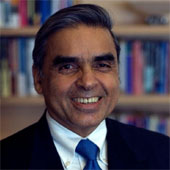Dealing with the Muslim World: Five Western Mistakes
Why did Europe and the United States choose not to help Islamic countries for real?
March 9, 2005
We will spend the most part of the 21st century handling the many problems generated by America’s, and the West’s, confusing and conflicting policies to deal with the Islamic world.
The first strategic mistake made by the West was to assume that its long-term interests were best served by a world in which Islamic states were mired in poverty and backwardness.
The second strategic mistake, which flowed from the first, was a policy — never articulated, perhaps never conscious, but nevertheless very real — not to share the successful policies of modernization with the Islamic world.
The United States had a Marshall Plan to develop Europe after World War II — even a plan to develop Japan.
The obvious question is why no such grand plan was devised for the Islamic world — or even for a few Islamic societies.
Was it a result of pure ignorance of the need for one — or of a calculation that the Islamic world was better off non-modernized? Historians will probably debate this for centuries. I have no doubt that Western and Islamic historians will reach opposite conclusions.
A third strategic mistake was to not see the huge importance of encouraging the success of Muslim moderates in Islamic societies.
Many bright Western-educated Muslim minds are troubled by the poverty and backwardness of the Islamic world. And they do not subscribe to the radical agenda of Osama bin Laden.
Many of these Muslim moderates want their societies to be economically and politically compatible with the West, while remaining in social and spiritual terms true to their Islamic heritage.
In short, they want to trigger both the equivalent of a renaissance and a rationalist enlightened movement in the Islamic world. They would make ideal partners of the West. But the West has not helped them. Instead, the West has in recent decades helped those who suppress them.
The fourth strategic mistake of the West was not to consciously promote the spread of modern secular education in Islamic societies.
Instead, the West looked away — or even quietly winked approval — when $300 million per year of private Saudi money went into establishing Wahabi-influenced madrassahs, which fostered medieval fundamentalism, not modernity.
These madrassahs, quietly established in states that had supported the West in the Cold War, like Pakistan and Indonesia, have provided a ready pool of recruits for Osama bin Laden and Al-Qaeda and its affiliates.
It takes an enormous effort to take a mind already steeped in 10 years of Wahabi education and re-educate it in the ways of the Modern world.
The fifth strategic mistake made by the West was to implement economic policies that brought short-term electoral benefits to the democratically elected leaders in Western societies — but came at the expense of long-term damage to Islamic societies.
Any number of examples prove the point. Take one. After 9/11, President Musharraf and his country, Pakistan, immediately became key allies in the battle against Osama bin Laden and al-Qaeda. Not long after 9/11, he came to Washington, D.C. — to seal this strategic partnership and friendship.
To survive politically at home against the Islamic extremist parties, Musharraf — like a good Western politician — had to deliver economic benefits. He sought only economic concessions from America, primarily a bigger textile quota to get more jobs in Pakistan.
America turned him down. The few voters of North Carolina who were textile workers were more important than the larger national interest of America in helping Musharaff survive politically.
What about the role of Europe in the failure to share the fruits of modernization with the Islamic world? Unlike America, Europe does not sit an ocean away from the Islamic world.
A small sea, the Mediterranean, separates Europe from North Africa. Thousands of Africans — including North African Arabs — have begun crossing it illegally to get into Europe. Hence the current European paranoia about immigrants.
But in all this hysteria, there is little attempt by Europe to understand what it may have done to instigate this trickle, which by the end of this century will become a flood — unless Europe decides to deliver the obvious solution. They need to export a successful model of development to an Islamic country, better still, to a group of Islamic countries.
It would be virtually impossible to find documentary proof that Europe made a strategic decision not to share its success with the Islamic world.
The decision may not even have been conscious. Many such decisions are the product of visceral reflexes of Europeans towards Islam.
Nor can I prove that the Europeans watched with smug satisfaction as one Islamic society after another failed to modernize either in the 19th or 20th centuries — long after Europe had begun its steep upward climb — with the smugness redoubling as their former Islamic colonies stumbled rather than move forward after decolonization.
None of this was ever expressed.
It would have been politically impolite to do so. But among policymakers, a quiet consensus developed that Europe would be better off with a struggling and underdeveloped Islamic world. They assumed it would pose a lesser threat to Europe than a successful Islamic world. We now know that the opposite is true.
From “Beyond the Age of Innocence: Rebuilding Trust Between America and the World” by Kishore Mahbubani © Copyright 2005. Reprinted by arrangement with PublicAffairs, a member of the Perseus Books Group.
Read previous
America as a Revolutionary Force
March 8, 2005
